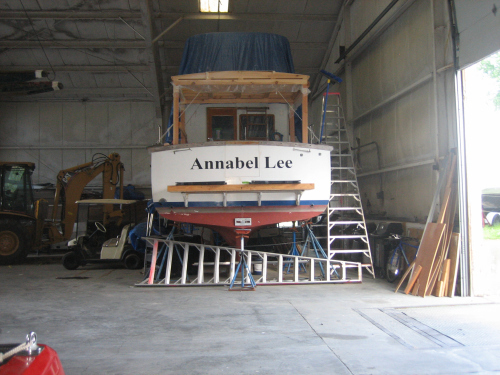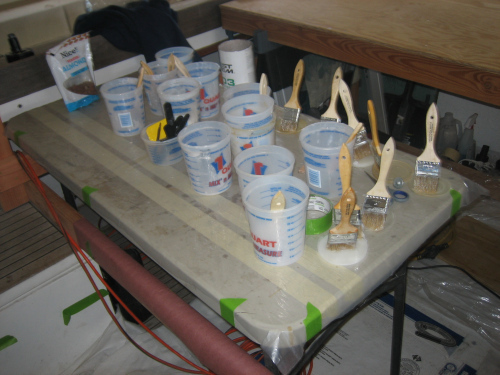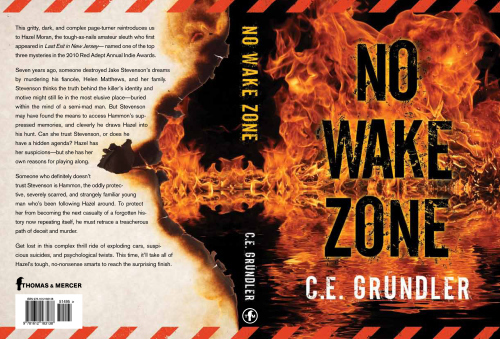C.E. Grundler's Blog, page 12
June 15, 2012
Newton’s Law and New Habits…
Comfort is nice. It’s something we all strive for. Things are going well; life is relaxed, easy, with minimal stress. What more could anyone ask for?
Challenge.
The danger in getting too comfortable is, if we’re not careful, it allows us to settle into lazy patterns. And while there’s nothing wrong with some occasional laziness, all things are wonderful in moderation. Comfort is a goal, and once you’ve attained a goal, it’s time to either set another goal or accept that you’ll be perfectly content to look back in a year, and five, and ten, satisfied that nothing has changed. Or, as Newton put it: “An object at rest stays at rest and an object in motion stays in motion.”
Anyone who has followed this blog for a reasonable length of time should know I don’t do “at rest.” I’m perpetually on the go and involved in various undertakings. My tag-line, “Eternally chasing the ever elusive leaks,” referred to the original slant of this blog, boat restoration, though it has gradually gone out of context as each leak is banished and my posts have branched out into aspects of my life as a writer. And looking through it, looking back, I recently concluded that while I’m always involved several simultaneous and possibly insane undertakings, it’s all become almost routine to me. This level of “in motion” is my norm. It’s what I do, and I’m comfortable with that. Perhaps a bit too comfortable.
The time has come to take things up a notch, to accelerate that motion. I’ve set myself some new goals. I’ve been putting more time than ever into Annabel Lee, making great progress towards the goal of a complete and operational boat. And I’m writing more, setting higher goals for output, starting with posting here more often, making it part of my daily routine. The key to reaching a goal is by simply adding a new routine until it becomes habit, then building on that, one small step at a time. Each step forward becomes another accomplishment. Each accomplishment is another victory, and that momentum is a powerful force for change. Momentum is good.








June 14, 2012
When is rape ‘OK’?
Well, that’s a bit of a shocking heading to show up here in my blog. Bobbing corpses and squished skulls, yeah. Fiberglass, leaky decks, engine work, mice under the hood, sure. But rape? OK, no less? On what planet? Planet fiction. Come, let’s visit.
I once read that in order to create a sympathetic character that readers will embrace, you need to ensure that they first suffer undeserved misfortune. Readers who are shocked by what a character has suffered empathize more, and this is especially true for female characters. During the time I was searching for an agent I was told this on more than one occasion. I was breaking a critical rule by not having my protagonist first suffer some type of devastating harm. I was informed that you can’t have a tough, capable female character simply because she is tough. No matter how epic she may be, we must first see her broken, humiliated. Simply put, in order to make Hazel a more sympathetic character, I should adhere to a time tested formula: I should have her raped and/or brutalized early in the story. Let readers see her suffer, and she’d win more hearts in the end.
While I see the logic in this approach, there’s something I find particularly troubling about the underlying concept. It makes rape ‘acceptable’ within the guidelines of the plot, because we know the poor victim is going to get her vengeance by the end. I’ve been told The Girl with the Dragon Tattoo’s Lisbeth Salander (in both the book and movie, neither of which I’ve read/seen,) is FAR more violent and vengeful than Hazel, though each time, the standard “it’s because she was brutally raped,” disclaimer applies. Translation: her violence is acceptable and understandable, as is the, so I’m told, extremely graphic sexual violence she first suffers. Don’t let it upset you, it’s just a plot device, and our fair maiden will be stronger for having endured it. So long as she’s first been force-fed a large helping of brutal but plot driving violence, our delicate little hero can now fight back – though I was also advised that she should be very troubled and remorseful by her actions, no matter how justified.
Perhaps I might have won over more fans if I’d gone that route. Maybe it was advice I should have followed. I didn’t. But it does raise the question: is sexual brutality acceptable when it’s not necessary to the plot but used simply as a device to gain a character sympathy?








June 13, 2012
Genre Stereotypes and Gender Double-Standards
I’ll preface this post by stating that I’m well aware, as with everything in else life, there are exceptions to what I’m about to discuss, and those exceptions are a good thing. But a stereotype, by definition, is a widely held but fixed and oversimplified concept of a particular type of person or thing. And when that thing is a book, when it comes to reading, a majority of readers will make choices based upon some basic, commonly accepted conventions of plot and formula for a specific genre. For example, whether tame or steamy, romances revolve primarily around two people who initially can’t see eye-to-eye but ultimately discover their romantic love for one another, and the story will end on a happy, optimistic note. Fantasy novels usually occur somewhere imaginary, and while they often include subplots ranging from mysterious to romantic, magic of some sort or another is a key element. Readers turn to erotica primarily to be turned on. They pick up cozies, expecting a light, even humorous mystery with bloodless, off-screen murders, minimal sex and violence, featuring an amateur, often female sleuth in a small-town setting where she can turn to family, friends and authorities, though often she’s dismissed as being ‘nosy and meddlesome.’ Hobbies such as knitting, baking, and scrapbooking are popular themes. Thrillers, memoirs, science fiction – the list goes on and each of these genres carries with it certain accepted guidelines.
And then there’s hard-boiled. Lean, unsentimental, gritty. A genre where the protagonist goes head-to-head with the ugly realities of a dangerous world, and they frequently go it alone. Faced with a darker side of life and forced to survive, they fight violence with violence, often far from the assistance or the eyes of the authorities. It’s a bloody, vicious world of “be tough or be killed.” And for decades, this world has been the domain of the American tough guy. Donald Westlake’s Parker and John D. MacDonald’s Travis McGee are superb characters and perfect examples: physically and emotionally scarred, square-jawed, hard-hitting, hard-drinking and hard-loving men of action, cynical, calculating, and capable. The “shoot first, ask later” types who operate outside the law and follow their own moral compasses. And in these tales, the majority of the female characters fall into certain specific roles. They’re either a love interest, a victim in need of rescue and/or avenging, a femme fatale, or all of the above. And often, they have a low survival rate.
Again, I know exceptions exist, but what I’m discussing here is the stereotype of the traditional hard-boiled mystery. The stereotype that leads some readers to see the word ‘Hardboiled’ in a description and go into a book with certain gender-specific expectations. And conversely, for readers who see the protagonist’s age and gender, then expect a cozier story. The first lines of the description should make it clear that isn’t the case. Nice young ladies really shouldn’t be dumping bodies at sea. Then again, that isn’t stopping Hazel Moran, and she can’t figure where anyone got the idea she was nice to begin with.
Despite the fact that she’s faced with a threat, even as she has been left no choice and it’s a case of kill or be killed, even as Hazel does whatever it takes to survive, protect herself and her family, refusing to be a victim, some readers have stated both in reviews and letters to me that they were shocked by the violence from this “young girl.” It seems ironic that within the setting of a more traditional hard-boiled with a more traditional (male) protagonist, these same actions wouldn’t so much as raise an eyebrow. In fact, they’d be expected and approved. Apparently, stepping outside the traditional, more accepted genre and gender formulas established generations earlier makes some readers uncomfortable, and double standards continue, even to this day.








June 12, 2012
Displacement speed…
C.E. Grundler
For years I’ve moved at displacement speed, at first under sail and most recently chugging along at six to seven knots in my stocky little trawler. Displacement speed teaches patience. The horizon hangs off in the distance with oil-painting like permanency and the shoreline changes in incremental fractions. Other boats come into view, radioing their location to friends (“I’m coming up on some slow trawler,”) as though you’re a fixed aid to navigation and then continue on to disappear into that still unchanged horizon. You have plenty of time to think, plenty of time to remind yourself you’re in no rush, after all getting there is half the fun and all those speed demons are just racing from fuel dock to fuel dock, wallets in hand. But sometimes… sometimes the ‘GETTING there’ part gets a bit old. There’s still that other half, BEING there, especially when the weather turns ugly and ‘there’ is somewhere comfortable and secure, with a hot shower, dry clothes and a warm meal.
Back when I was working in a boatyard we had a hand-full of customers with insanely high-speed performance boats stop by from time to time. And on one particular occasion a fellow had launched his rocket toy and asked if anyone wanted to join him as he tested some of the latest performance tweaks he’d made to the engines. It was a slow day, none of us were doing much of anything, and my story had some chapters with a similar boat, so I said, “Sure, I’ll go.”
The river was glassy smooth as we set out, with the faintest hint of a breeze stirring along the Saturday morning sailors. As we cleared the mooring field my friend pushed the throttle forward, the engines roared, and I was forced backwards into my seat. The world around us seemed to freeze; at that velocity we were the only thing moving as we shot between the now motionless sailboats, and for a moment I recalled that scene in Return of the Jedi, where the speeder bikes threaded between the giant trees in the forests of Endor. Time and relativity had been turned upside down; I’m certain if I’d checked, the hands on my watch had stopped. The water beneath us had gone from a gently rolling fluid to rock hard solid, the hull banging across it like a runaway bobsled on ice as we shot beneath the Tappan Zee Bridge and past the astonished faces aboard the sloop Clearwater. Within minutes we’d covered water that would have taken me half a day’s sail to navigate. I couldn’t move, I don’t think I even blinked, but my tearing eyes shifted to the GPS and it felt as though my heart stopped. We were travelling at 92 mph. At last we had gone full circle and I was returned to the dock, dazed and stunned as I tried to process the wild ride. It was a hell of an experience, and one I came away from a bit bruised and a lot wiser, with plenty of material for those chapters I was writing and a new-found appreciation for displacement speed.








June 11, 2012
MFA? WTF?
A big part of life, of existence, is trying to figure out answers, often when we don’t even know the questions. But lately I do have one answer: “Author.” That’s what I’ve finally learned to reply when asked the ever-popular, “What do you do?” It’s taken years to reach this point. But the part that makes me laugh is another question that usually follows. “Where did you study?”
Uhm? Study? Seriously? Hell, I pretty much stopped paying attention half-way through high school. Not to knock the public education system, but 1.) I planned to sail to far ends of the earth, and I saw little value in much of what they were teaching, and 2.) anything of interest that they were teaching I more or less already knew. I’d been reading ahead in textbooks for years, and within the first week of class I’d usually read the year’s lessons from cover to cover. By time the teacher got around to each chapter, I’d already been there, done that, moved on to some detective novel and could care less about the class discussions. In the end I could ace most of my tests, but was labeled a problem student who rarely paid attention or contributed. Looking back, I suppose perhaps I should have paid a bit more attention in English; I’ve been told I have issues with my Oxford Commas… but that’s why editors exist.
Fast forward to a few years back, when I’d first completed Last Exit in New Jersey, (and I say first, because that story has gone through numerous reworkings before becoming the book it is today,) I optimistically set out in search of my ideal agent, certain my debut work was a blockbuster in the making. Hey, when you’re dreaming, you might as well shoot high. And the first step involved composing a killer query letter, so I dug in and did my research. I read books, blogs, and online articles, versing myself in what I’d need to do to make my query enticing and intriguing. The blurb was easy, but regularly I’d read that I should include the writer’s organizations to which I was a member, as well as where I earned my MFA.
MFA? WTF is an MFA? A bit more research yielded an answer: a Master of Fine Arts degree, something that would have required years of study beyond the Bachelor’s degree I never obtained. I needed an MFA to write a book? I guess I missed that memo. No, I’d been out there, living life. I hadn’t spent the requisite time between university walls; I was out in the world, paying my tuition in a different way and learning my lessons by living them firsthand. Losing my first car to a flood. Losing my first apartment to a fire. Driving around in a $100 Buick held together with pop-rivets. Discovering at twenty-one, as my peers were partying, I was going to be a mother. Buying fixer-uppers – cars, trucks, boats, homes – and then fixing them because that was the only way to afford these things. I’ve worked as everything from a commercial driver to a lobby ornament/receptionist in a high end corporation, a commercial illustrator, a boatyard manager, along with various other unusual jobs in between. I learned to learn from everything, both at the time and looking back. That talent from high school carried over, I’d learned if you give me a manual and a day or two, I can teach myself nearly anything from VI Editing and UNIX to rebuilding an outboard and keeping a diesel engine running.
As I’ve come to notice how many of my fellow writers hold MFAs, I began to wonder if yet again I’d zigged in life when I should have zagged. My education has come from years of triumphs, failures, gains and setbacks – and often I’ve learned more from a single failure than from multiple wins. I’ve learned to learn from others around me, to pay attention to those who are ‘doing it right’ and pause to consider how and why. And while I don’t have a diploma from the School of Hard Knocks, for better or worse, the degree I’ve earned comes through in who I am and how I write.
To my amusement, even as I was composing this post, Vincent Zandri offered his writing advice on education and it certainly gave me a smile. And here’s some grammar rules from Vampire Weekend.








June 8, 2012
Priorities and persistence…
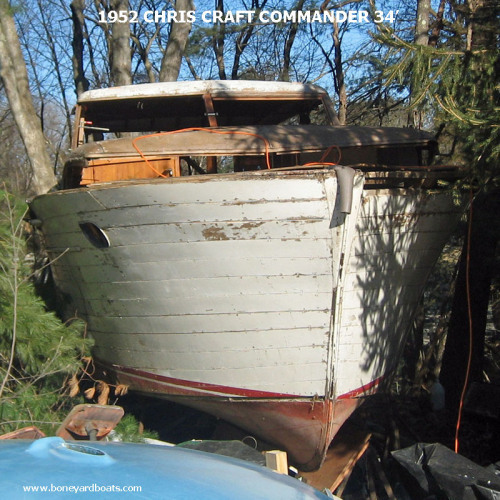
A sad reality, (and no, this is not my boat,) but with some skill, persistence, time and work, she could be beautiful.
Photo: http://www.boneyardboats.com
It’s Friday, and I’m back down to the boat, getting a head start on the weekend’s projects. Today: some tedious prep work, but it’s one of those chores that I can really immerse myself into, and it won’t matter if my notebook is smudged up with epoxy – in fact, the scribbling I put down on days like this often outshines hours spent parked at my desk.
I’ve been making some changes lately, shifting my work routines, both in my writing and aboard the boat, into high gear. It’s a matter of priorities, of focusing on what matters. I see boats tucked in the furthest corners of the yard, backed to the brush and overgrowth. At some point in their existence, each had been someone’s pride and joy. Now they stand as silent reminders of failed aspirations and testaments to abandoned dreams. Perhaps their owner had fallen upon bad times or eventually the reality of boat ownership outweighed the dream, draining and straining finances and relationships, sometimes past the point of no return. Like a novel in a desk drawer, these grand dreams fell victim to the harsh realities of life.
To keep a dream going strong, to make it a reality that endures, be it a boat, or a book, or eventually a shelf full of books, requires persistence. Believing, and never giving up on what you believe. It’s been a long road, but the boat is coming together nicely at last. And along that road, I managed to write two novels. Now it’s time to really dig in and complete the third book, and the fourth, and the fifth, and to keep going. There were other ways to fix this boat. They might have been easier, faster, cheaper. But I’m in this for the long run. I plan to keep this boat around for a long time to come, and to travel far beyond where I am now. I’ve got plenty of work ahead, but I’m already well on my way. One plank, one layer of cloth, one word at a time…it’s just a matter of sticking with what you truly believe, and never quitting.








June 7, 2012
The Old Dude and the Dinghy…
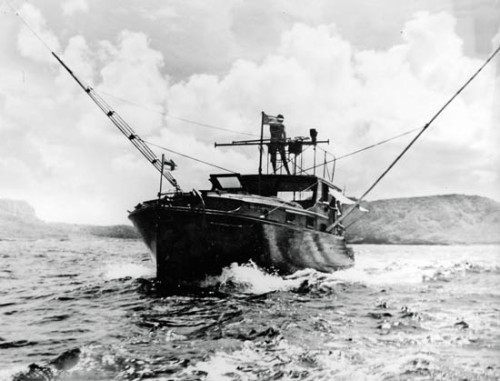
Hemingway’s Pilar – fishing, done right.
I’ll admit it right here: aside from his choice in boats, I’m not much of a Hemingway fan.
I know, as a writer, Hemingway is considered legendary, and I suppose it might be in my best interests to understand why – or at least make an attempt. But the truth of the matter is the trauma of high school assigned reading still haunts me, and the mere whisper of such things as Edith Wharton’s Ethan Frome and Hemingway’s The Old Man and the Sea still conjure up unpleasant memories of incomplete book reports and the stern glares of frustrated teachers who tried to instill in me a love of all things literary. It wasn’t that I didn’t love reading – it was a rare day when I didn’t have some dog-eared old hard-boiled detective novel nestled between the pages of my textbooks – but why did it seem that class assignments always centered around the most painfully tedious tomes wrought with hidden symbolism and utterly miserable characters. Ethan Frome? Seriously? Too much angst. And The Old Man and the Sea…well, I went into that one with higher expectations, after all there was one thing I did know about Hemingway. He had a boat. Not just any boat, but Pilar, a graceful 38’ Wheeler Playmate, one of the most beautiful sportfishing boats ever created, and he was an avid fisherman. I spent some of the best years of my childhood aboard a 38’ Wheeler, and I loved to fish. This book was inspired by his time fishing aboard that boat. Boats, fishing. That sounded promising. Maybe this wouldn’t be so bad after all.
But there wasn’t any Wheeler to be found motoring along within those pages, or any real plot that I could recall. It was a beaten down old guy in a rowboat, and he never even lands the fish. A dude in a dinghy, along with some deep and profound hidden message that held little significance to me at that point in life. Epic battle? Epic yawn. All that kept running through my head was, “You’re gonna need a bigger boat.” The sharks chowed down on his prize, my eyes glazed over and my interest switched back to John D. MacDonald’s Travis McGee, sipping gin and calling the shots as he righted wrongs, cruised aboard his houseboat, the Busted Flush, and rumbled along in Miss Agnes, his electric blue Rolls Royce pickup. No matter that my teachers declared those paperbacks worthless trash; Travis was way more interesting than Santiago. If there was something moving about Hemingway’s story, I just wasn’t getting it, and I’ve never had the desire to revisit that tale to figure out what, if anything I missed in the first place. But recently I read something that surprised me about Hemingway, and that got me to thinking about the legend that surrounds him.
Apparently, Hemingway was actually rather introverted. It stands to reason: he was reportedly intensely private, intuitive and introspective, and I suppose as writers go those are useful qualities. Introverts by nature are more content to listen and observe than to talk about themselves, which serves us well for building characters and plots. We’re not shy, we’re just reserved, and we’d much rather hear what others have to say. We’re listening and we’re thinking. True, Hemingway was known for his bravery and adventurous personality, but he also valued his solitary time, as evidenced by his prolific body of work. Looking through black and white photos of Hemingway, I notice he’s most often alone or with one or two others, and he seems to carry an expression of intense thoughtfulness. So what is it behind the legend? Was he actually the most interesting man in the world…or the most interested one?








June 6, 2012
How did I get here?
Last night I found myself tucked into the corner of a table at 44 and X, a very stylish little restaurant over in Hell’s Kitchen, surrounded by some big name authors and editorial people from Thomas & Mercer and Amazon Publishing. The night before, it was a cocktail party at Ink48 Press Lounge. And I asked myself… how did I get here?

Yes, it is me, dressed up. It happens once in a while.
I received an invitation from my publisher to both events, and though I wasn’t attending Book Expo America, both the cocktail party and the dinner were a short train ride from my side of the Hudson, and this would be my chance to finally put faces to the people I’d been dealing with since last summer. Oh, and to network, I suppose, though anyone who knows me knows I’m not really a ‘network’ type person. I’m a solitude type, and the moment I stepped out into that loud, crowded lounge, filled to bursting with wall-to-wall laughter and unfamiliar faces, my first instinct was to U-turn it right back into the elevator. It’s amusing how pressing through Penn Station at rush hour doesn’t faze me, and I’m perfectly comfortable wandering the streets of Queens, but set me in the middle of a social event like this and I start backing towards the exit. But I was there for a reason, and armed with a glass of Glenfiddich, I braced myself and headed in. From the looks of it, everyone there seemed to know most everyone else…everyone except me. No name tags, no means to tell who was who, no idea where to start. This was my first foray into the world of publishing, and I was completely out of my element. Ultimately I retreated to a quiet corner and stared longingly out at boats making their way up and down the Hudson.
I realize these events, from the writer’s groups and conventions to the cocktail parties, are part of the landscape many authors navigate along their way to publication. It goes with the territory, this process of making connections, networking, and I began to wonder if I might have overlooked something I should have been doing from the beginning. I eavesdropped on the animated conversations swirling around me and wondered if I’d missed some critical step in the process. I wrote a book simply because I enjoyed writing. I never really though much beyond that, and the last year had been a whirlwind of amazing and unexpected changes. But now I was on the outside, looking in.
Throughout the room, books from Amazon’s various imprints lay scattered across the low tables, including, ironically enough, a copy of Last Exit in New Jersey on the table beside me. As I sipped my drink a tall fellow wandered over and picked it up, flipping through it. I warned him that it was an awful book, and it was receiving some terrible reviews. Great icebreaker, huh? We started talking, and I caught that his name was Johnny and he was also an Amazon author, though through the noise I didn’t clearly hear his last name. But I was able to learn he was quite at home in this setting and he knew a good deal of the people there, including my editors and various marketing team members. I was delighted to finally meet Jacque, Eleni and Leslie face to face – they’re a wonderful group to work with, and even more fun to hang out around. And before long I found not only was I surviving my first night, but I was actually having fun!
Compared to the cocktail party, I figured the second night would be a breeze. Only a dozen people at dinner together, strictly the Thomas & Mercer crowd, including a few familiar faces from the first night. But I quickly discovered myself surrounded by some of the biggest names in the T&M stable, all heavy hitters with years of publishing behind them and reputations to match. And me. The noob. The lone self-published author that somehow caught Amazon’s eye. The more I looked around, the more I listened to the other conversations, the more I felt like I was way out of my league. I did my best, I joined in when I could, but I began to wonder if I had any business being there. And that’s Vincent Zandri, the author of numerous international bestsellers, made it clear to me that indeed I did. He told me to look around at the other authors with whom I was dining, all well-regarded in the publishing world. Amazon signed each and every one of them for a reason, and they signed me for a reason as well. “These are very smart people at Amazon,” he told me, “They know what they’re doing, and they wouldn’t have picked you if they didn’t believe in your work.”
Writing can be a lonely business, but as we spoke I realized it didn’t have to be. And thanks to a great author offering me precisely the encouragement I needed, I began to see that I’m right where I should be, and I’m just getting started. He made me understand I shouldn’t sweat the little things. I should focus on what really matters and what I truly enjoy: my writing. Reputations like Vincent Zandri’s are built step by step, book by book, reader by reader. And for an author at the beginning of this amazing, often intimidating journey, connecting with someone like Vincent Zandri helped me to put things into proper perspective, and for that I am grateful.
For more of Vincent Zandri’s wonderful wisdom and insights, check out his blog: The Vincent Zandri Vox








June 5, 2012
Looking a bit more ship-shape…
I know. Technically, she doesn’t look much different than she has for far too long, at least from this angle. But inside is a different story altogether as things all come together.
WE HAVE RIBS!
And here’s where the new overhead joins with the original section.
Two layers of double-width ‘ribs’ are laminated over an original rib and a new single rib to give maximum strength. The screws in the photos are temporary clamps; we’ll remove them and fill the holes with thickened epoxy, and the bolts hanging down are attached to 2×4″ ‘guides’ on the bridge to keep everything aligned as the epoxy set. Next: hardware out and layers of glass cloth go up, then it’s topsides to glass from above.
And finally, the aftermath of the weekend. This is our cockpit work area by day’s end. I usually just let everything in the Mix-n-Measure pots harden, then pop the set epoxy out, resulting in a clean, reusable container and a levitating chip brush.








May 22, 2012
Launch day…
It’s official. We have launched. No, not the boat — by my pictures it’s pretty obvious that’s going to take a bit more time. But today is the release date for No Wake Zone. So, for all of you who read Last Exit in New Jersey and have been patiently waiting to learn what’s next for Hazel, Hammon, Annabel, and Stevenson, here’s your chance. Happy reading, everyone!
and have been patiently waiting to learn what’s next for Hazel, Hammon, Annabel, and Stevenson, here’s your chance. Happy reading, everyone!
(And for anyone who hasn’t read Last Exit yet, it seems that Amazon has currently discounted it to $.99.)












